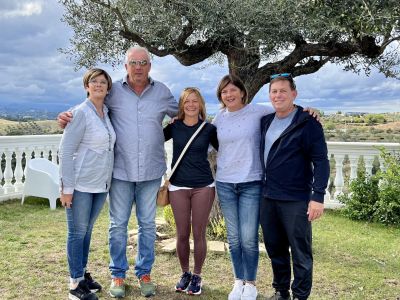La scrittrice descrive le esperienze dove ha incontrato qualcuno in Abruzzo che hanno parenti in Ohio. Annette Januzzi Wick dice che quattro volte è stata in diverse località della regione e ha incontrato persone con un legame con lo stato dell'Ohio. Una volta stava a un agriturismo vicino al paese di Roccamorice dove la chef aveva uno zio a Cleveland. Un'altra volta stava a Rocca Calascio, un villaggio isolato. Durante una conversazione con uno sconosciuto, l'uomo ha detto che è stato a Hinckley, la piccola città in Ohio. Con queste esperienze, dice con un sorriso e una risata che sembra che ogni italiano abbia un parente nel nostro stato.
Everywhere I traveled in Abruzzo, the people I met wanted to talk about cugini or parenti back in the states. For whatever reason, these relations lived in the least suspecting place – in proximity to me in Ohio.
The first instance was my own obvious connection between Spoltore, Abruzzo and Ohio and my newly discovered second cousins, as well as previous relatives known through their correspondence with my mother in the 1990s. The Italians who arrived in the U.S. in the early 1900s came for jobs in the coal mines, steel mills, and railroads. They came for work, for freedom, and for family members back home in Italy who didn’t want to be forgotten. Like my cousins when we finally met. And like Marisa Sanelli of Agriturismo Pietra Antica.
After a day of hiking the Grand Maiella, near Roccamorice, to the eremo di San Bartolomeo in Legio, we turned in for the night in Decontra’s Agriturismo Pietra Antica, operated by la proprietaria, Marisa. She was that warm sort of aunt who extended her arms for you to drown in her embrace.
Along with my husband, Mark, and myself, her homestead also hosted yoga practitioners and two men from Belgium who had hiked together for 20 years. Marisa welcomed us to dinner by sharing her origin story. One that included Cleveland. According to legend, Marisa was uncertain about her culinary expertise to launch an agriturismo which required cooking all day, for weeks and months at a time. I still hear the three syllables in her beautiful tongue, Cle-ve-land, when she spoke of her father’s brother, from Cleveland, who came to visit and assured Marisa her skills were on par with the best in the land. He was right.
Days later, we drove to the rustic, isolated town of Rocca Calascio in L’Aquila, to stay at another agriturismo. While out strolling the quiet alleys, we struck up a conversation with an older man, seemingly the only inhabitant that day, who had peeked out his doorway. He too had a relation from Ohio who was a professor, perhaps. Ten minutes later, that person arrived. We conversed in Italian until the gentleman said, “Hinkley.” “I know Hinkley,” I shouted. Growing up in northeastern Ohio, we’d drive to Hinkley in early springtime to watch the buzzard’s roost. The gentleman lived in Hinkley and frequented Little Italy in Cleveland. With family from nearby Sulmona, he returned to visit Abruzzo every year.
Was there a name for that happenstance of zeroing in on Italians with Ohio connections, or sensing Midwesterners with Italian ancestries? Writer Dawn Powell once said, “All Americans come from Ohio, if only briefly.” Perhaps there’s a version of “All Italians have a cousin in Ohio.”
The precariousness of the connection, more than anything else, lends weight to understanding how easily threads fray. In the same way my Appalachian colleagues write for the world to better understand their values, their challenges, and how African Americans reach into the past to comprehend the impact of their uprooting, these networks do the same for me, for other Italians and Italian Americans. In these enclaves, we find safety and love.
Back in the states, while a guest at a home in Mississippi, I chatted with a man whose brown eyes resembled those of others I have loved. He was from Uniontown, PA. “You’re Italian,” I pointed out. “How did you know?” he asked. My grandmother’s family lived near the coal mines of Fayette County. His family might have been Sicilian, but all I cared about was his pronunciation of gnocchi.
Through additional research in Abruzzo, I linked up with another person while visiting Spotlore. Vincenzo D’Anniballe is on a mission to create a sister city between Steubenville, OH, and Spoltore. Many descendants of Abruzzese origin found themselves in the city famous as Dean Martin’s, or Dino Paul Crocetti’s, birthplace. When Vincenzo and I traced our ancestors, I discovered my great-great-grandmother, Annadomenica, shared the same surname as his.
Given time to learn technology, my mother, who was conceived in Spoltore and born in Salineville, OH, would never have lost touch with her Italian roots. I wonder if making a connection over satellite to a world she never knew, but felt in her bones, might have altered the path of her dementia. I’ll go on believing so, incentivizing me to maintain correspondence abroad, keep up my Italian lessons, and never stop cooking Italian for the sake of my cognitive functioning. And for cugini everywhere.
Annette Januzzi Wick is a writer, teacher, speaker, and author of two memoirs. Her writings have appeared in Ovunque Siamo, Italian Americana, Italy Segreta, an upcoming Abruzzese cookbook to raise funds for Turkey’s earthquake survivors, and in Cincinnati Magazine, Nextavenue.com, 3rd Act Magazine, Belt Magazine, Creative Nonfiction. Her upcoming work includes SOMETHING ITALIAN, a collection of essays and recipes about the Italian American culinary experience. A mix of Abruzzese and Calabrese roots, Annette lives with her husband in Cincinnati's historic Over-the-Rhine. Visit annettejwick.com for more.
https://www.lagazzettaitaliana.com/history-culture/10230-everyone-in-italy-has-a-cousin-in-ohio#sigProId2c1773df88




